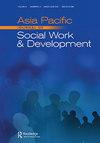Do resilience and social support buffer Vietnamese college students’ mental health during the COVID-19 pandemic? A pilot study
IF 1
4区 社会学
Q3 SOCIAL WORK
Asia Pacific Journal of Social Work and Development
Pub Date : 2023-10-10
DOI:10.1080/02185385.2023.2269125
引用次数: 0
Abstract
ABSTRACTThis pilot study aimed to investigate college students’ mental health during the peak of COVID-19 pandemic in Vietnam and its associated factors, such as resilience and perceived social support. A total of 101 college students completed an online survey on Qualtrics in the last quarter of 2021, when Vietnam was under social distancing measures. The results show that, at the peak of the pandemic, more than 80% of college students in the study reported at least mild depression, with very high prevalence of mild and moderate depression (39.44% and 30.99% respectively). Resilience and perceived social support were associated with each other, and both were found to buffer students’ mental health, yet resilience became an insignificant predictor when other covariates were added to the linear regression model. This pilot study prepares for the development of the larger study to develop resilience training programme for college students to cope with emergency situations.KEYWORDS: Vietnamese college studentsmental healthresiliencesocial supportCOVID-19 Disclosure statementNo potential conflict of interest was reported by the author(s).articleAdditional informationFundingThe work was supported by the Vietnam National University’s University of Social Sciences and Humanities, Hanoi .Notes on contributorsTrang Thu NguyenTrang Thu Nguyen, PhD, MSW, is currently a social work faculty at the University of Social Sciences and Humanities, Vietnam National University, Hanoi, where she previously earned her Bachelor’s and Master’s degrees in social work. She completed her doctoral training in social work at the University of South Carolina and postdoctoral training at the Center for Studies of Displaced Populations, Department of Global Community Health and Behavioral Sciences, Tulane University School of Public Health and Tropical Medicine. Her research interests include mental health problems, such as depression and dementia, as well as resilience and coping among older adults and their family caregivers. She is also interested in culturally competent, community-based, and art-based interventions for these groups. She has worked on several research projects on mental health problems and sociopsychological treatments for adults with mental disorders in Vietnam, as well as situations of and interventions for dementia family caregivers in Vietnam and the United States.韧性和社会支持是否能缓解2019冠状病毒病大流行期间越南大学生的心理健康?一项初步研究
摘要本研究旨在调查越南新冠肺炎疫情高峰期大学生的心理健康状况及其相关因素,如心理弹性和感知社会支持。在越南实施社交距离措施的2021年第四季度,共有101名大学生完成了关于素质的在线调查。结果显示,在疫情高峰期,本研究中80%以上的大学生报告至少有轻度抑郁,其中轻度和中度抑郁的患病率非常高(分别为39.44%和30.99%)。心理弹性与感知社会支持呈显著相关,均对学生心理健康有缓冲作用,但在线性回归模型中加入其他协变量后,心理弹性成为不显著的预测因子。这项试点研究为开展更大规模的研究做准备,以制定大学生应对紧急情况的应变能力训练方案。关键词:越南大学生心理健康弹性社会支持covid -19披露声明作者未报告潜在利益冲突。该研究得到了越南国立大学河内社会科学与人文大学的支持。作者简介strang Thu Nguyen,城市生活垃圾博士,目前在越南国立大学河内社会科学与人文大学从事社会工作,并在那里获得了社会工作学士和硕士学位。她在南卡罗来纳大学完成了社会工作博士培训,并在杜兰大学公共卫生和热带医学院全球社区卫生和行为科学系流离失所人口研究中心完成了博士后培训。她的研究兴趣包括心理健康问题,如抑郁症和痴呆症,以及老年人及其家庭照顾者的应变能力和应对能力。她还对这些群体的文化能力、社区和艺术干预感兴趣。她曾参与多个研究项目,涉及越南成人精神疾病的心理健康问题和社会心理学治疗,以及越南和美国痴呆症家庭护理人员的情况和干预措施。
本文章由计算机程序翻译,如有差异,请以英文原文为准。
求助全文
约1分钟内获得全文
求助全文
来源期刊

Asia Pacific Journal of Social Work and Development
SOCIAL WORK-
CiteScore
4.10
自引率
5.00%
发文量
21
 求助内容:
求助内容: 应助结果提醒方式:
应助结果提醒方式:


